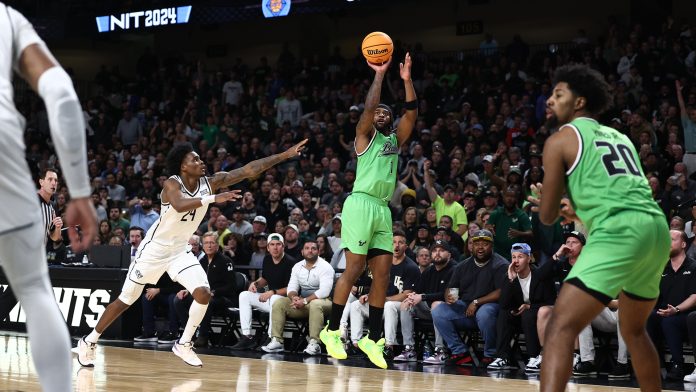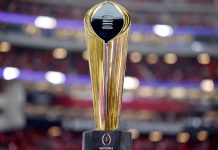
The NCAA’s changes to the National Invitation Tournament selection process this year were designed to preserve the viability of the once-storied event in the face of possible competition. By favoring teams from the Power Six conferences, the logic went, viewership would be up, revenue would be up and it would deal a blow to competing tournaments.
Then the rejections started piling up.
At least eight schools, including seven from the conferences given priority, either declined their invitations or made it known before Selection Sunday that they weren’t interested. Xavier, at 16-17, was one of the 32 teams included.
The Big East, in fact, had five teams make the field — a sixth, St. John’s, said no thank you — while much was made of only three conference teams making the NCAA Tournament field. Of those NIT bids, only Seton Hall won its opener, 75-72 over St. Joseph’s in overtime.
Villanova, Providence and Butler all lost at home. So did LSU, to North Texas of the American Athletic Conference, which won the tournament last year by beating fellow AAC and mid-major member UAB. In all, six of the 16 seeded teams lost, all at home, and five of them were from Power Six conferences.
Dan Gavitt, the NIT board chair and NCAA senior vice president of basketball, said money was a factor in making the changes, which he said will be evaluated.
“We’re operating in a very dynamic and disruptive time in college sports. And that’s part of our kind of calculus and decision making around this as well,” he said. ”We’ll have to see how it plays out and have conversations with our conferences in our schools and decide how best to format and compose the NIT going forward.”
The NIT is college basketball’s oldest major postseason tournament and once its most prestigious, with games played at New York City’s Madison Square Garden since its inception in 1938 until 1977, when early rounds were shifted to campus and regional sites. The semifinals and final were left at the Garden, with New York a nice options for teams and fans left out of the NCAA field.
Changes have come of late. The 2020 NIT, like the NCAA tourney, was canceled because of the pandemic and the 2021 event was played with a smaller field in Texas. The 2022 final was back at the Garden, but last year the final three games were held in Las Vegas and the final four next week will be played in Indianapolis.
Among the new bid changes, the NIT guaranteed spots to two teams from each of the Power Six not chosen for the NCAA Tournament regardless of their season record. It also did away with guaranteeing a spot to any regular-season conference champion that fails to also win its conference tournament.
Myriad factors caused the changes, Gavitt said. Among those, talk that a new tournament was in the planning stages to rival the NIT for participants, and the reality that a half-empty Power Six arena might not look as compelling as a packed and raucous smaller gym, but it still draws more fans both in the building and on television.
“If we lose the high majors from participating in the NIT, it has a dramatic impact on the very viability of the event,” he said. A great atmosphere at a smaller venue may make for high drama, “but 2,000 people in a small venue versus 6,000 people in a large venue has a financial impact.”
Coaches at mid-major schools were admittedly “disappointed,” Gavitt said, when the changes were announced in October, and that has hardly changed.
“Absurd,” was Richmond coach Chris Mooney’s reaction to the NCAA’s announcement. His team won the Atlantic 10 regular season, but not the tournament and still earned an NIT invite, but even before that, he said “I think it’s a joke and I think that it’s a kind of decision that makes everyone take the organization far less seriously.”
First-year Notre Dame coach Micah Shrewsberry admits to not being sure which side to be on. He was an assistant at Butler, then of the Horizon League, when the underdog Bulldogs reached back-to-back NCAA national championship games in 2010 and 2011, losing both.
“You can see it from either side, in a lot of different ways, who’s getting hurt by these rules changes,” Shrewsberry said.
Ryan Odum knows the value of postseason play, wherever it is.
At UMBC in 2017, the Retrievers won three games in the Collegeinsider.com postseason tournament, whetting their whistle for postseason play. The following year, UMBC became the first No. 16 seed to win an NCAA Tournament game, a 74-54 stunner against Virginia. He has subsequently guided Utah State (2021) and VCU (2024) to the NIT in his first year with those programs.
“You’ve had some teams over the years, North Texas, I mean, you’ve had some teams that have really done well in the NIT and it’d be a shame to take away some of those opportunities and give it just the power fives,” Odum said.
When North Texas won 84-77 in Baton Rouge last week, LSU guard Trae Hannibal admitted “I think they wanted it a lot more than we did.”
That differing level of desire has been an NIT issue before. In 2013, Kentucky had to travel to Robert Morris for a first round game. Students and other fans packed the Colonials’ gym and the standing room-only crowd of 3,444 saw their underdogs send the Wildcats home, 59-57 losers.
Motivation isn’t the only reason teams opt out, Gavitt said, highlighting another issue in a vastly changing college landscape.
A coach’s uncertain job status and player availability concerns cause some teams to decline an NIT invite. The transfer portal window opens right after Selection Sunday and, for teams left out of the 68-team tournament, going shopping for player help in the portal might be more attractive.
The changes are ones coaches have to accept, Pittsburgh coach Jeff Capel said. His team was one of those that declined the NIT’s invitation.
“I think all of us need to understand that college athletics and college basketball is not the same as it was when we were younger, as we grew up, and everyone has to adapt to that and change and get used to it,” he said before his team chose not to play. “Not saying we don’t like it or we’re going to like it, but that’s the reality.”
___
Get poll alerts and updates on the AP Top 25 throughout the season. Sign up here. AP college basketball: https://apnews.com/hub/ap-top-25-college-basketball-poll and https://apnews.com/hub/college-basketball






